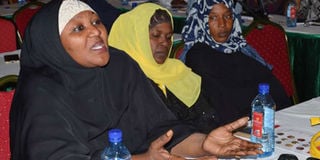Widows of terror suspects tell of agony

Zeinab Abdi Farah (left), whose brother has been missing since he was abducted in Mombasa in July, 2015, addresses a forum on building resilience in countering violent extremism at the PrideInn Hotel Mombasa on July 13, 2016. With her are her family members. PHOTO | KEVIN ODIT | NATION MEDIA GROUP
What you need to know:
- Widows accused the government of meting out “collective punishment” for the sins of their husbands.
Speaking at a forum organised by the Kenya Muslim Women Alliance (Kemwa) in Mombasa on countering violent extremism, they said their lives were a nightmare, especially when acquiring documents such as identification cards for their children.
Widows in the coast region whose husbands were killed in terror-related incidents have spoken out on the miserable life they live.
The women accused the government of meting out “collective punishment” for the sins of their husbands.
Speaking at a forum organised by the Kenya Muslim Women Alliance (Kemwa) in Mombasa on countering violent extremism, the widows said their lives were a nightmare, especially when getting documents such as identification cards for their children.
Ms Fatma Ahmed, 32, a mother of a 14-year-old girl, said she was afraid her daughter might not be able to get an ID when she reaches 18 because of her father’s “sins”.
“Among the documents required to acquire an ID is her father’s death certificate, but getting it is a huge problem,” she says.
“My husband was killed in Somalia. I do not know how or where he was killed or by whom yet I am told to acquire his death certificate. How do I get that?” she wondered.
She admitted that her husband, Swaleh Nabhan, was a terror suspect but asked: “Should a child suffer because of her father’s mistakes?”
Nabhan is believed to have masterminded the Kikambala attack in 2002 and was put on the list of most wanted terror suspects by the US government.
Nabhan was also wanted in Kenya for the same crimes, as well as for his alleged involvement in the 1998 bombing of the United States embassy in Nairobi in which over 200 people were killed and 5,000 injured.
Ms Mwanamkasi Mzee, whose husband Abdikadir Rehan was among those killed in 2014 in a terrorist attack in Mpeketoni, Lamu County, also complained about government ‘‘victimisation”.
“Does it mean my children should suffer because of the transgressions of their father? We are Kenyans and so are our children,” said Ms Mzee.
The two were among a group of women who gathered to share their pain following the violent deaths or disappearance of their husbands or relatives who either joined al-Shabaab or fell victim to forced disappearances.
The women appealed to the community to accept them.
TO COOPERATE
Kemwa chairperson Faridah Rashid urged the women to cooperate with the government and report cases of people who have disappeared.
“Cooperating with the government will be one way of ending this menace that is destroying our society,” said Ms Rashid.
Ms Sada Suleiman, whose husband Hemed Salim, a terror suspect, disappeared in February, 2014, says raising her children alone has become a huge challenge.
She says she does not know whether to declare herself a widow or not because she is yet to get answers from the police about his whereabouts.
“I do not have anyone on whose shoulder to cry on. I am struggling to raise my children alone but what pains me is that I do not know whether my husband is alive or not, that is the only thing I would like to know,” she said.
Ms Rukia Alfan, whose brother was among those who joined al-Shabaab and was killed in Somalia, says one way to solve the problem of youths joining the terrorist group is for the community to accept them when they return home and to work together to fight the menace instead of stigmatising them and their families.
“My brother disappeared and, after six months, called and said he was in Somalia. This is a problem we are facing here, but we have to stand together and get to know these people that take our children or influence them into joining those terrorist groups,” she said.
Her family, she says, is stigmatised and has been forced to move house three times because of discrimination.
“It has now become hard for us to interact with other people. The same people we used to call friends have changed. They no longer want to be seen interacting with us,” she said.
Meanwhile, parents of youths who disappeared say their efforts at follow up have hit a brick wall.
Last week, human rights activists said there was a need for a team of lawyers to be constituted to investigate extra-judicial killings and forced disappearances.
They said an independent judicial commission of inquiry should be set up to investigate the killings, which are rampant in the northeastern and the coast region.





